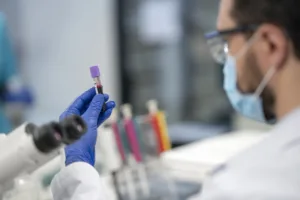Imagine a world where medications are tailored to your unique genetic profile, ensuring optimal effectiveness and minimizing side effects. Sounds like science fiction? Well, it’s not. With the advent of pharmacogenetic testing, also known as PGx testing, this personalized approach to medicine is becoming a reality.
But what exactly is PGx testing? How does it work? And how can it revolutionize the way we treat illnesses and manage chronic conditions? In this article, we delve into the intricacies of PGx testing and explore its potential to transform healthcare as we know it.
From the analysis of your DNA to the prediction of medication response, join us on a journey through the world of pharmacogenomics and discover the power of personalized medicine testing.

Key Takeaways:
- Pharmacogenetic testing, or PGx testing, is a personalized medicine approach that analyzes an individual’s genes to determine the most effective medications and dosages.
- This type of testing can predict medication response, dosage requirements, and the likelihood of experiencing side effects.
- PGx testing is typically performed using a sample of saliva, blood, or cells from the cheek.
- Personalized medicine testing holds promise for optimizing treatment plans and improving health outcomes for patients.
- Despite implementation challenges, such as healthcare professionals’ knowledge and integration into clinical practice, pharmacogenetic testing is poised to revolutionize the way we approach healthcare.
What is Pharmacogenetic Testing?
Pharmacogenetic testing, also known as pharmacogenomics, involves studying how an individual’s genes influence their body’s response to medications. Genes carry DNA information that determines various characteristics, including how the body uses and breaks down drugs. Differences in these genes can affect the effectiveness of certain medications or lead to adverse reactions. Pharmacogenetic testing provides valuable information about an individual’s genes to help healthcare providers make informed decisions about the most suitable medication and dosage for each patient. This testing is part of the broader field of precision medicine, which aims to customize and optimize healthcare approaches based on an individual’s unique characteristics.
What is the Purpose of Pharmacogenetic Testing?
Pharmacogenetic testing serves multiple important purposes in personalized medicine, including determining medication effectiveness, establishing appropriate dosages, and predicting the likelihood of experiencing side effects. By analyzing an individual’s genetic information, healthcare providers can gain valuable insights into how specific medications are likely to affect them, enabling the design of personalized treatment plans based on each patient’s unique genetic makeup.
In cases where a medication is not producing the desired therapeutic effect or causing adverse reactions, pharmacogenetic testing guides healthcare providers in selecting alternative treatments or adjusting dosages to achieve optimal outcomes. This advanced form of genetic testing allows for customized and precise medical intervention, ensuring that patients receive the most effective medications at the right dosages while minimizing the risk of side effects.
By incorporating pharmacogenetic information, healthcare providers can tailor treatment plans to suit an individual’s genetic profile, maximizing the benefits of medication and minimizing potential risks.
In addition to determining medication effectiveness and dosage determination, pharmacogenetic testing also plays a crucial role in predicting the likelihood of experiencing side effects. By identifying specific gene variants, healthcare providers can anticipate how patients may respond to certain medications and make informed decisions regarding treatment options. This proactive approach helps reduce the occurrence of adverse reactions and enhances patient safety.
The Importance of Pharmacogenetic Testing in Personalized Medicine
“Pharmacogenetic testing allows for precision and individualized medicine by leveraging genetic information to optimize treatment outcomes.”
The integration of pharmacogenetic testing into healthcare practices has revolutionized the field of personalized medicine. With a deeper understanding of an individual’s genetic makeup, healthcare providers can tailor treatments based on precise genomic information, leading to enhanced medication effectiveness and improved patient outcomes. By leveraging pharmacogenetic testing results, healthcare providers can fine-tune treatment plans and optimize dosages to achieve the desired therapeutic effects while minimizing the risk of adverse reactions.
Pharmacogenetic testing enables a new era of personalized medicine, shifting away from a one-size-fits-all approach to a tailored and data-driven medical practice.
| Benefits of Pharmacogenetic Testing | Pharmacogenetic Testing in Action |
|---|---|
|
A patient experiencing adverse reactions to a medication can undergo pharmacogenetic testing to identify genetic variants responsible for the negative response. Based on the test results, the healthcare provider can select an alternative medication or adjust the dosage to maximize therapeutic benefits and minimize side effects. This tailored approach ensures a more effective and safer treatment plan for the patient. |
How is Pharmacogenetic Testing Conducted?
Pharmacogenetic testing, also known as pharmacogenomics, is conducted using various methods to analyze an individual’s genetic information. These tests typically require a sample of saliva, blood, or cells swabbed from the inside of the cheek. The choice of sample collection method depends on the specific test and the healthcare provider’s preferences.
For a blood test, a healthcare professional will draw a blood sample from a vein in the patient’s arm. This procedure is performed using a sterilized needle and syringe. The sample is then sent to a laboratory for genetic analysis.
A saliva test, on the other hand, involves collecting a sample of saliva from the patient. This can be done by spitting into a small tube or using a specialized swab or pad to collect the saliva. The collected sample is then sent to a laboratory for further evaluation.
A cheek swab test is conducted by gently rubbing the inside of the patient’s cheek with a specialized swab. This process collects cells from the cheek, which are later analyzed in a laboratory to obtain genetic information.
At-home test kits are also available for certain pharmacogenetic tests. These kits allow patients to collect their saliva sample in the comfort of their own homes. The collected sample is then sent to a laboratory for analysis. It’s important to note that at-home tests may not provide accurate results for making treatment decisions and should be discussed with a healthcare provider.
Here’s an informative table summarizing the different sample collection methods used in pharmacogenetic testing:
| Sample Collection Method | Procedure |
|---|---|
| Blood Test | A healthcare professional draws a blood sample from a vein in the patient’s arm. |
| Saliva Test | The patient collects a sample of saliva by spitting into a small tube or using a specialized swab or pad. |
| Cheek Swab | A healthcare professional gently rubs the inside of the patient’s cheek with a specialized swab. |
| At-Home Test Kits | Patients collect a saliva sample at home and send it to a lab for analysis. |
What to Expect During Pharmacogenetic Testing?
The process of pharmacogenetic testing depends on the type of sample needed. The three common methods for sample collection are blood test, saliva test, and cheek swab.
Blood Test:
For a blood test, a healthcare professional will insert a small needle into a vein in the patient’s arm to collect a blood sample. Although this procedure may cause slight pain or bruising, the discomfort usually resolves quickly.
Saliva Test:
During a saliva test, patients will be provided with instructions on how to provide their sample. This can be done by spitting into a tube or using a special swab or pad to collect saliva.
Cheek Swab:
If a cheek swab is required, a healthcare professional will gently rub the inside of the patient’s cheek with a specialized swab.
It is essential for patients to follow any preparation instructions provided by their healthcare provider. These instructions may include avoiding eating, drinking, smoking, or chewing gum before a saliva test to ensure accurate results.
The risks associated with pharmacogenetic testing are minimal. Blood tests carry a slight risk of pain or bruising at the injection site, while saliva tests and cheek swabs are non-invasive and pose no significant risks to patients.
| Sample Type | Risks |
|---|---|
| Blood Test | Slight risk of pain or bruising at the injection site |
| Saliva Test | Non-invasive and pose no significant risks |
| Cheek Swab | Non-invasive and pose no significant risks |
Image:

Interpreting Pharmacogenetic Test Results
Pharmacogenetic test results provide valuable information about gene variants present in an individual’s genetic makeup. These gene variants play a crucial role in determining how certain medications are likely to affect the patient. However, it’s important to note that gene variants alone do not provide a comprehensive understanding of the overall health condition.
Healthcare providers use pharmacogenetic test results in combination with other relevant information to make informed treatment recommendations and adjustments. By analyzing the test results and considering various factors, they can determine which medications are most likely to work effectively for the patient’s unique genetic profile. Additionally, healthcare providers can identify the most appropriate dosage to maximize medication benefits.
The test results also have the ability to predict the likelihood of experiencing side effects from certain medications. This information allows healthcare providers to tailor treatment plans and explore alternative options if a specific medication is not suitable for the patient.
By incorporating pharmacogenetic information, healthcare providers can make evidence-based decisions about treatment options. This personalized approach to medication selection and dosage optimization enhances patient care and improves treatment outcomes.
Example Illustrative Quote:
“Pharmacogenetic test results enable physicians to consider an individual’s unique genetic makeup when making treatment decisions. By understanding how certain medications interact with specific gene variants, healthcare providers can personalize treatment plans, minimizing side effects and maximizing the effectiveness of the medication.”
| Benefit | Description |
|---|---|
| Personalized Treatment Recommendations | Pharmacogenetic test results guide healthcare providers in selecting medications and dosages that are more likely to be effective for each patient. |
| Optimized Medication Response | By considering an individual’s genetic profile, healthcare providers can identify the most appropriate dosage to achieve optimal medication response. |
| Prediction of Side Effects | Pharmacogenetic testing helps predict the likelihood of experiencing side effects from certain medications, allowing for proactive management and alternative options. |
Benefits of Pharmacogenetic Testing
Pharmacogenetic testing offers several benefits in the field of personalized medicine. By analyzing an individual’s genetic information, healthcare providers can personalize treatment plans based on the patient’s unique genetic makeup. This approach improves medication effectiveness by selecting drugs that are more likely to yield positive results for each patient. It also optimizes dosages, ensuring that patients receive the appropriate amount of medication to achieve the desired therapeutic effect.
Moreover, pharmacogenetic testing helps reduce the risk of adverse reactions and side effects by predicting potential sensitivities to certain medications. By tailoring treatment plans to an individual’s genetic profile, pharmacogenetic testing contributes to better health outcomes and improved patient care.
| Benefits of Pharmacogenetic Testing |
|---|
| Personalized treatment plans based on genetic makeup |
| Improved medication effectiveness |
| Optimized dosages for desired therapeutic effect |
| Reduced risk of adverse reactions and side effects |
Challenges and Future of Pharmacogenetic Testing
Despite the potential benefits, the widespread adoption of pharmacogenetic testing faces various challenges. Healthcare professionals may require additional education and training to effectively interpret and apply pharmacogenetic test results in clinical practice.
Integration of pharmacogenetic testing into existing healthcare systems and electronic health records can also be a complex process, necessitating significant technological advancements and interoperability standards.
Patient education and awareness about the value and implications of pharmacogenetic testing are crucial for its successful implementation. As an emerging field, patient understanding and acceptance play a pivotal role in the widespread adoption of this personalized medicine approach.
Overcoming these challenges requires ongoing efforts to enhance healthcare professionals’ knowledge and expertise, streamline the integration of pharmacogenetic testing into clinical practice, and prioritize patient education and engagement.
“The successful integration and expansion of pharmacogenetic testing as an essential component of personalized medicine depend on addressing these implementation challenges,” says Dr. Sarah Johnson, a leading geneticist in the field.
Future Directions of Pharmacogenetic Testing
The future of pharmacogenetic testing holds promising advancements and opportunities for personalized medicine. As healthcare professionals and researchers strive to overcome existing challenges, they are also exploring innovative approaches and technologies.
One of the potential future directions of pharmacogenetic testing is the development of point-of-care genetic tests. These tests would provide real-time genetic information for healthcare professionals to make immediate treatment decisions at the point of care.
Additionally, advancements in machine learning and artificial intelligence can enhance the interpretation of pharmacogenetic test results, thereby improving the accuracy of treatment recommendations and medication management.
“The future integration of pharmacogenetic testing into healthcare systems will revolutionize clinical decision-making, enabling precise and tailored treatment options for patients,” predicts Dr. Emily Rodriguez, a renowned pharmacologist.
Challenges and Future of Pharmacogenetic Testing
| Challenges | Future Directions |
|---|---|
| Healthcare professionals’ knowledge and training | Point-of-care genetic tests |
| Integration into existing healthcare systems | Advancements in machine learning and AI |
| Patient education and awareness | Enhanced patient engagement |
Conclusion
Pharmacogenetic testing plays a crucial role in personalized medicine, offering healthcare providers valuable insights into an individual’s unique genetic profile. By examining genetic information, healthcare professionals can customize treatment plans, ensuring the use of the most effective medications and optimal dosages while reducing the risk of side effects. Despite challenges surrounding implementation and integration into clinical practice, pharmacogenetic testing shows immense potential for improving health outcomes and transforming the healthcare industry.
Moving forward, as the field continues to advance, pharmacogenetic testing will become increasingly vital in guiding personalized medication decisions. As healthcare professionals gain more knowledge and expertise in interpreting genetic test results, personalized medicine will gain wider acceptance as a standard practice. The integration of pharmacogenetic testing into routine healthcare will revolutionize patient care by providing tailored treatment options based on individual genetic variations, leading to better health outcomes and enhanced patient satisfaction.
In conclusion, the future of healthcare lies in the power of pharmacogenetic testing. By embracing this innovative approach, healthcare providers can further optimize patient care, paving the way for a new era of personalized medicine and genetic testing. As precision medicine continues to evolve, pharmacogenetic testing will prove to be an indispensable tool for delivering targeted treatments and improving the overall well-being of patients. To read more great PGx articles, go here.
FAQ
What is the process of PGx testing?
PGx testing, also known as pharmacogenetic testing, involves analyzing an individual’s genetic information to understand how their genes may impact their response to medications. This type of testing helps healthcare providers select the most effective medication and dosage based on an individual’s genetic makeup.
What is pharmacogenetic testing?
Pharmacogenetic testing, also known as pharmacogenomics, is the study of how an individual’s genes influence their body’s response to medications. It helps healthcare providers make informed decisions about the most suitable medication and dosage for each patient based on their genetic information.
What is the purpose of pharmacogenetic testing?
The purpose of pharmacogenetic testing is to determine the effectiveness of a specific medication for an individual, establish the appropriate dosage, and predict the likelihood of experiencing side effects. It helps healthcare providers personalize treatment plans based on an individual’s unique genetic profile.
How is pharmacogenetic testing conducted?
Pharmacogenetic testing is typically performed using a sample of saliva, blood, or cells swabbed from the inside of the cheek. A healthcare professional may draw a blood sample, collect a saliva sample by spitting into a tube or using a special swab, or conduct a cheek swab by gently rubbing the inside of the patient’s cheek.
What to expect during pharmacogenetic testing?
The process of pharmacogenetic testing depends on the type of sample needed. For a blood test, a healthcare professional will draw a blood sample from the patient’s arm. For a saliva test, patients may need to spit into a tube or use a special swab. Cheek swabs involve gently rubbing the inside of the patient’s cheek with a specialized swab. Patients should follow any preparation instructions provided by their healthcare provider, and the risks associated with testing are minimal.
How to interpret pharmacogenetic test results?
Pharmacogenetic test results provide information about gene variants found in an individual’s genetic makeup. Healthcare providers use these results, along with other relevant information, to make treatment recommendations and adjustments. The results can help determine which medications are likely to work best for the patient’s genetic profile and the most appropriate dosage to achieve optimal benefits.
What are the benefits of pharmacogenetic testing?
Pharmacogenetic testing allows healthcare providers to personalize treatment plans based on an individual’s unique genetic makeup. It improves medication effectiveness by selecting drugs that are more likely to yield positive results and optimizes dosages to achieve the desired therapeutic effect. The testing also helps reduce the risk of adverse reactions and side effects by predicting potential sensitivities to certain medications.
What are the challenges and the future of pharmacogenetic testing?
Challenges associated with the widespread adoption of pharmacogenetic testing include healthcare professionals’ need for additional education and training to effectively interpret and apply test results. Integrating pharmacogenetic testing into existing healthcare systems and raising patient awareness about its value are also important. Overcoming these challenges and addressing ethical, legal, and social issues will contribute to the future integration and expansion of pharmacogenetic testing as an essential component of personalized medicine.
What is the conclusion regarding PGx testing?
Pharmacogenetic testing plays a vital role in personalized medicine, allowing healthcare providers to personalize treatment plans based on an individual’s unique genetic profile. It helps improve medication effectiveness, optimize dosages, and reduce the risk of adverse reactions. Despite implementation challenges, the future of pharmacogenetic testing looks promising for enhancing health outcomes and revolutionizing healthcare.





